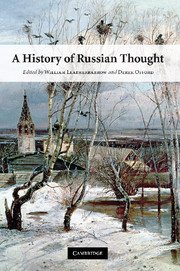Book contents
- Frontmatter
- Contents
- Preface
- List of contributors
- Dates, transliteration and other conventions
- Dates of reigns
- Russian titles of journals, newspapers and miscellanies
- PART I CONTEXT
- PART II INTELLECTUAL CURRENTS
- PART III THEMES AND CONSTRUCTS
- 9 The West
- 10 The East
- 11 The people
- 12 The intelligentsia and capitalism
- 13 Natural science
- PART IV THE AFTERLIFE OF CLASSICAL THOUGHT
- Biographical details of thinkers and writers
- Selected bibliography
- Index
10 - The East
Published online by Cambridge University Press: 05 June 2012
- Frontmatter
- Contents
- Preface
- List of contributors
- Dates, transliteration and other conventions
- Dates of reigns
- Russian titles of journals, newspapers and miscellanies
- PART I CONTEXT
- PART II INTELLECTUAL CURRENTS
- PART III THEMES AND CONSTRUCTS
- 9 The West
- 10 The East
- 11 The people
- 12 The intelligentsia and capitalism
- 13 Natural science
- PART IV THE AFTERLIFE OF CLASSICAL THOUGHT
- Biographical details of thinkers and writers
- Selected bibliography
- Index
Summary
The Russian soul undeniably has an ‘Asian stratification’.
Nikolay Berdiaev‘What is Asia to us?’ Dostoevsky once famously asked. The author wondered about the East's significance in a newspaper column he wrote after General Skobelev had stormed the Central Asian fortress of Geok Tepe in 1881. His answer was straightforward: ‘[It] provides the main outlet for our future destiny.’ To this cheerleader for General Skobelev's glorious exploits in the sands of Turkestan, the East was something to be conquered for the greater glory of tsar and fatherland. In this sense, Dostoevsky neatly fits into the late Edward Said's orientalist template, which argues that European perceptions of Asia are inextricably linked to colonialist conquest and control over a malevolent, inferior ‘other’. But if at first glance the novelist's thoughts appear to be in line with those of such European contemporaries as Cecil Rhodes and Jules Ferry, a deeper reading of his article betrays a more ambivalent view of Asia. Dostoevsky went on to explain, ‘the Russian is not only a European but also an Asian’. Alluding to a common western perception of his nation as eastern, he added: ‘We must free ourselves from this servile fear that Europeans will call us Asiatic barbarians and say that we are more Asian than European.’ There was clearly no shame in having a semi-oriental identity.
As Dostoevsky's musings suggest, there is no straightforward answer to the question of Asia's meaning in the Russian mind.
- Type
- Chapter
- Information
- A History of Russian Thought , pp. 217 - 240Publisher: Cambridge University PressPrint publication year: 2010
- 1
- Cited by

